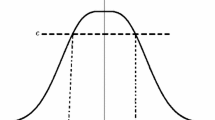Abstract
In general, a database system will not operate properly if it exist some null values of attributes in the system. In this paper, we propose a new approach to estimate null values in relational database, which utilize other clustering algorithm to cluster data, and use fuzzy correlation and distance similarity to calculate the correlation of different attribute. For verifying our method, this paper utilize mean of absolute error rate (MAER) as evaluation criterion to compare with other methods; it is shown that our proposed method proves importance than the existing methods for estimating null values in relational database systems.






Similar content being viewed by others
References
Babad YM, Hoffer JA (1984) Even no data has a value. Commun ACM 27(8):748–757
Bradley PS, Fayyad U (1968) Refining initial points for k-means clustering. In: Proceedings of the 15th international conference on machine learning. pp 91–99
Bradley PS, Fayyad U, Reina C (1998) Scaling clustering algorithms to large databases. In: The 4th international conference on knowledge discovery and data mining. pp 27–31
Chen SM, Chen HH (2000) Estimating null values in the distributed relational databases environments. Cybernet Syst Int J 31(8):851–871
Chen SM, Huang CM (2003) Generating weighted fuzzy rules from relational database systems for estimating null values using genetic algorithms. IEEE Trans Fuzzy Syst 11(4):495–506
Chen SM, Lee SW (2003) A new method to generate fuzzy rules from relational database systems for estimating null values. Cybernet Syst Int J 34:33–57
Chen SM, Yeh MS (1997) Generating fuzzy rules from relational database systems for estimating null values. Cybernet Syst Int J 28(2):695–723
Chen SM, Yeh MS (2002) A method for generating fuzzy rules from relational database systems for estimating null values. In: Leondes CT (ed) Intelligent systems: technology and applications, vol 4. CRC Press, Boca Raton, pp 157–179
Cheng CH, Lin Y (2002) Evaluating the best main battle tank using fuzzy decision theory with linguistic criteria evaluation. Eur J Oper Res 142(1):174–186
Chiang DA, Lin NP (1999) Correlation of fuzzy sets. Fuzzy Sets Syst 102:221–226
Codd EF (1979) Extending the database relational model to capture more meaning. ACM Trans Database Syst 4(4):397–434
Dubois D, Prade H (1980) Fuzzy sets systems: theory and applications. Academic Press, New York
Forgy E (1965) Cluster analysis of multivariate data: efficiency vs. interpretability of classifications. Biometrics 21:768
Han J, Kamber M (2000) Data mining: concepts and techniques. Morgan Kaufmann, New York
Hsieh CH, Chen SH (1999) Similarity of generalized fuzzy numbers with graded mean integration representation. In: Proceedings of the 8th international fuzzy systems association world congress, vol 2. pp 551–555
Huang X, Zhu Q (2001) A pseudo-nearest-neighbor approach for missing data recovery on Gaussian random data sets. Pattern Recogn Lett 23:1613–1622
Kaufmann A, Gupta MM (1985) Introduction to fuzzy arithmetic. Van Nostrand, New York
MacQueen JB (1967) Some methods for classification and analysis of multivariate observations. In: Proceedings of the 5th Berkeley symposium on mathematical statistics and probability, vol 1. pp 281–297
Pappis CP, Karacapilidis NI (1993) A comparative assessment of measures of similarity of fuzzy values. Fuzzy Sets Syst 56(2):171–174
Parsons S (1996) Current approaches to handling imperfect information in data and knowledge bases. IEEE Trans Knowl Data Eng 8(3):353–372
Ross TJ (1995) Fuzzy logic with engineering applications. McGraw-Hill, New York
Zadeh LA (1965) Fuzzy sets. Inf Control 8:338–353
Zadeh LA (1973) The concept of a linguistic variable and its application to approximate reasoning. Memorandum ERL-M 411, Berkeley, October 1973
Zaniolo C (1984) Database relations with null values. J Comput Syst Sci 28(1):142–166
Zimmermann HJ (1991) Fuzzy set theory and its applications, 4th edn. Kluwer Academic, Dordrecht
Acknowledgements
The authors would like to thank the anonymous referees for providing very helpful comments and suggestions. Their insight and comments led to a better presentation of the ideas expressed in this paper.
Author information
Authors and Affiliations
Corresponding author
Rights and permissions
About this article
Cite this article
Cheng, CH., Wang, JW. A new approach for estimating null value in relational database. Soft Comput 10, 104–114 (2006). https://doi.org/10.1007/s00500-004-0430-3
Published:
Issue Date:
DOI: https://doi.org/10.1007/s00500-004-0430-3




